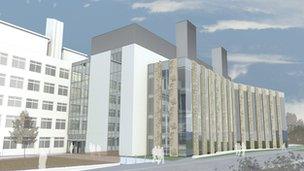Science of life in the economy
- Published

The Newhouse plant attracts smaller companies to use the equipment and facilities
Just off the M8 at Newhouse, there's a shiny newish building packed to the steel rafters with tiny glass tubes in plastic trays.
Stored at a dry -20C and robotically-selected, it has the capacity to store 90 million chemical compounds.
This is National Libraries Day, and this is one library of note.
Happily, Scotland has the expertise to be able to read what these compounds can tell us.
For more than 50 years, the Newhouse plant has been a base for pharmaceuticals; for most of that time, it was part of the Dutch firm Organon, sold on to Schering Plough and then to Merck, as the industry consolidated.
But as the scale of the companies has grown, the industry's been changing. The cost of developing new drugs, and the loss of income as cheaper foreign manufacturers have snapped up licence opportunities, has forced a huge cut-back in researchers.
Newhouse was one such casualty, closed just over two years ago. The science parks of England have suffered badly since then.
But in Lanarkshire, the plant has been re-opened as BioCity, attracting much smaller companies to use the equipment and facilities that Merck left behind.
Compound interest
That's why it was particularly important this week that Newhouse was announced as the main winner in a 12-way competition to secure European funding for a £170m drug discovery project.
This brings 300,000 compounds to the facility, contributed by seven big pharma companies, with a book value of £75m.
The EU-funded project also provides for several research partners to create 200,000 more. These can be used for 48 projects per year, over five years, to screen for new drugs.
It's open to bidding from big and small pharma as well as university departments.
This method of testing new drug ideas against many thousand compounds - High Throughput Screening (HTS) - is likened to searching for a very small needle in a very large haystack. It's one reason why big pharma is finding research tough going, why there are doubts about the ability of HTS to deliver results, and why the industry is pooling resources in this way.
The Lanarkshire centre, with academic direction from Dundee and Oxford universities, will get only 40 jobs out of a £20m investment from Europe and the Scottish government.
But it's seen as a signal both that the skills and capacity can be found in Scotland to be a player in life sciences, and that more projects might be attracted to use the site.
Fallen Angel
That's important in a sector where the science base is strong, notably with Dundee University's drug discovery, but it's proving tough to get scale and momentum in the private sector.

A new life sciences centre is being built at Dundee University
It's particularly tough because access to finance is proving so difficult for necessarily high-risk investments.
This week's Scottish Enterprise Life Science Awards in Edinburgh had success to celebrate, but of course, there is no awards ceremony for the many who don't succeed. And there are Scottish success stories that go down the familiar route of buy-out from bigger companies elsewhere.
For a part of the economy that's seen as a big opportunity for Scotland, the job numbers are modest.
The most recent figures, for 2011, suggest employment in life sciences grew faster that year than any other, by 18%. That compares with growth against the Scottish government's six key growth sectors (food and drink, finance, energy, tourism, creative industries and life sciences) of only 0.4%, including an 11% drop in creatives.
But the rise in life science was to 17,300 out of 660,000 in these growth target areas. These are valuable, high-skill jobs and strategically significant, but it's still a small player.
And there's churn in this market. Just as Lanarkshire got 40 or so jobs from this Innovative Medicines Initiative, Angel Biotechnology was heading towards administration.
Though KPMG sounds positive about finding a buyer, that has put 22 jobs at risk at its Midlothian headquarters as well as at subsidiary Angel Biomedical in Glasgow and near Newcastle.
That's after December lay-offs at its manufacturing facilities for plasma and cells. Angel Biotech failed to land necessary contracts or to do either of two rescue deals it was attempting with a Russian partner and an international consortium with expertise in marketing for that sector.
In the words of the great Willie Nelson, this was one Angel flying too close to the ground.
You can also comment or follow Douglas Fraser on Twitter: @BBCDouglsFraser
- Published7 February 2013
